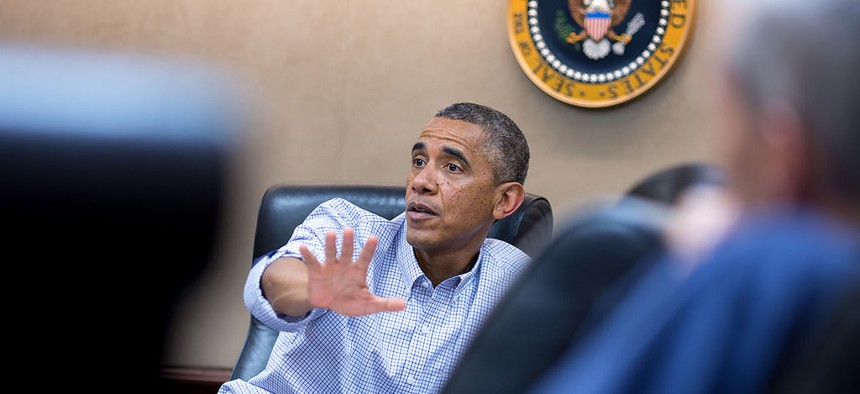
Pete Souza/White House
In Vox Interview, Obama Sets Limits on What a President Can Accomplish
From Iraq to political polarization, President Obama is more of a realist than candidate Obama was.
n his final two years as president, Barack Obama wants Americans to know he's constrained. In an interview with Vox released Monday, Obama laid out his obstacles. He's got Republicans in Congress inhibiting him from increasing the federal minimum wage. And overseas, Obama remains dubious of entangling the U.S. in another conflict, even as pressure mounts for him to more clearly define his strategy against the Islamic State.
Obama might be commander in chief, but his Vox interview reveals that in the "fourth quarter" of his presidency, he has a narrow view of what is still possible.
On Iraq
Perhaps it is not surprising that a man who campaigned to end the conflict in Iraq in 2008 remains skeptical of reengaging, even as ISIS militants stake their claim on territory there. In his interview with Vox, however, President Obama remained clear that he would not redeploy significant numbers of U.S. troops to Iraq to stop the escalation of violence there. That job, he argued, belongs to the Iraqi people.
"I have the authority as commander in chief to send back 200,000 Americans to reoccupy Iraq. I think that'd be terrible for the country. I don't think it'd be productive for Iraq," Obama told Vox's Matthew Yglesias. "What we've learned in Iraq is, you can keep a lid on those sectarian issues as long as we've got the greatest military on Earth there on the ground, but as soon as we leave, which at some point we would, we'd have the same problems again."
The president argued that while the U.S. might be reluctant to have a strong ground presence in areas where sectarian conflict has been present for centuries, that choice does not have to diminish American influence abroad.
"The real challenge for the country, not just during my presidency but in future presidencies, is recognizing that leading does not always mean occupying," Obama said. "The temptation to think that there's a quick fix to these problems is usually a temptation to be resisted."
On working with countries that have less-than-stellar human-rights records
In times of crisis, Obama made it clear, he does not always have the luxury of finding a faultless ally to support the U.S. and help achieve its goals. Using the example of China—a country that has a history of human-rights violations—Obama argued that sometimes an alliance is essential to help achieve global goals like reducing climate change.
"The goal of any good foreign policy is having a vision and aspirations and ideals, but also recognizing the world as it is, where it is, and figuring out, how do you tack to the point where things are better than they were before?" Obama said. "That doesn't mean perfect. It just means it's better.
On political polarization
Obama sharply focused his 2008 campaign on the promise of reducing partisanship and working together. What he experienced, after being elected, however, sharply differed from that promise of bipartisanship. Obama argued that the conflicts he's encountered with a GOP-controlled Congress don't stop in Washington; political polarization can be localized in gerrymandered congressional districts.
In his interview, Obama further conceded that, in a media environment where viewers and readers can seek out outlets that satisfy their political alignments, there may be very little a president can do to reduce partisanship.
"The balkanization of the media means that we just don't have a common place where we get common facts and a common worldview the way we did 20, 30 years ago. And that just keeps on accelerating," Obama said.
The president offered one piece of guidance for the next person who enters the White House: Reach out to less traditional forms of media in an effort to break through the divide. He also suggested that there be less "routine use of the filibuster"—an interesting statement given that Democrats in the Senate used the procedural move three times last week to stop Republicans from passing a Homeland Security Department funding bill that would also block Obama's executive action on immigration. The filibuster will continue to be a powerful tool for Senate Democrats over the next two years as they remain in the minority.
Overall, however, Obama said political polarization is nothing new.
"They're have been periods in the past where we've been pretty polarized. I think there just wasn't polling around," Obama said. "As I recall, there was a whole Civil War—that was a good example of polarization that took place."
On race relations
In the Vox interview, Obama said he's worried about where relations between minorities and police stand today, but he said he is optimistic that over time, those conflicts will be resolved. While the national spotlight has recently focused on racial tensions in communities like Ferguson, Mo., Obama said he's seen firsthand examples of diverse populations living in harmony.
"The key is to make sure that our politics and our politicians are tapping into that better set of impulses rather than our baser fears," Obama said.







